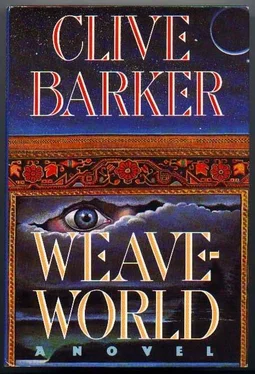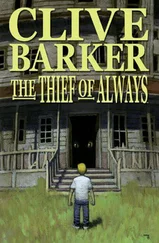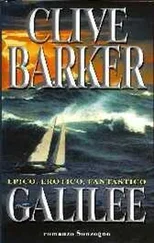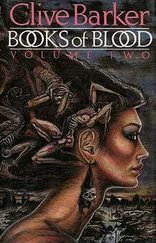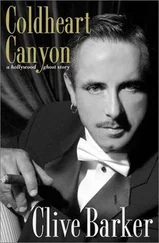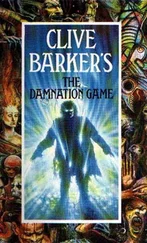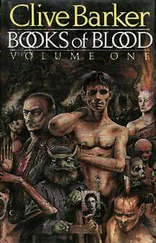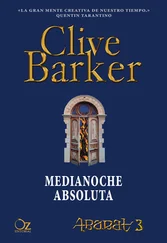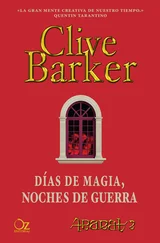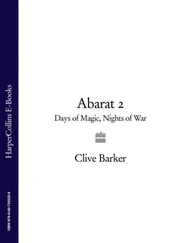Clive Barker - Weave World
Здесь есть возможность читать онлайн «Clive Barker - Weave World» весь текст электронной книги совершенно бесплатно (целиком полную версию без сокращений). В некоторых случаях можно слушать аудио, скачать через торрент в формате fb2 и присутствует краткое содержание. Жанр: Фантастика и фэнтези, на английском языке. Описание произведения, (предисловие) а так же отзывы посетителей доступны на портале библиотеки ЛибКат.
- Название:Weave World
- Автор:
- Жанр:
- Год:неизвестен
- ISBN:нет данных
- Рейтинг книги:4 / 5. Голосов: 1
-
Избранное:Добавить в избранное
- Отзывы:
-
Ваша оценка:
- 80
- 1
- 2
- 3
- 4
- 5
Weave World: краткое содержание, описание и аннотация
Предлагаем к чтению аннотацию, описание, краткое содержание или предисловие (зависит от того, что написал сам автор книги «Weave World»). Если вы не нашли необходимую информацию о книге — напишите в комментариях, мы постараемся отыскать её.
Weave World — читать онлайн бесплатно полную книгу (весь текст) целиком
Ниже представлен текст книги, разбитый по страницам. Система сохранения места последней прочитанной страницы, позволяет с удобством читать онлайн бесплатно книгу «Weave World», без необходимости каждый раз заново искать на чём Вы остановились. Поставьте закладку, и сможете в любой момент перейти на страницу, на которой закончили чтение.
Интервал:
Закладка:
Somebody darted between the trees a little way ahead of Cal, trailing laughter. To Cal's eyes the sound was momentarily visible; he saw the rise and fall of notes as splashes of light, which flew apart like dandelion heads in a high wind. Enchantment upon enchantment. Plucking and peeling yet another of Lo's remarkable fruits as he went, he hurried on towards the music.
And ahead of him, the scene came clear. A blue and ochre rug had been laid on the ground between the trees, with wicks in oil flickering along its borders; and at its edge the musicians he'd heard. There were five of them: three women and two men, dressed formally in suits and dresses, in the dark threads of which brilliant designs were somehow concealed, so that the subtlest motion of the folds in the flame-light revealed a glamour that brought to Gal's mind the iridescence of tropical butterflies. More startling, however, was the fact that this quintet had not a single instrument between them. They were singing these violins, pipes and drums, and offering in addition sounds no instrument could hope to produce. Here was a music which did not imitate natural sound - it was not bird or whale song, nor tree nor stream - but instead expressed experiences which lay between words: the off-beat of the heart, where intellect could not go.
Hearing it, shudders of pleasure ran down Gal's spine.
The show had drawn an audience of perhaps thirty Seerkind, and Cal joined them. His presence was noted by a few, who threw mildly curious glances in his direction.
Surveying the crowd, he attempted to allot these people to one or other of the four Families, but it was near enough impossible. The choral orchestra were presumably Aia; hadn't Apolline said that it was Aia blood that had given her a good singing voice? But amongst the rest, who was who? Which of these people were of Jerichau's Family, for instance: the
Babu? Which of the Ye-me, or the Lo? There were negro and Caucasian faces, and one or two with an oriental cast; there were some who boasted traits not quite human - one with Nimrod's golden eyes (and tail too, presumably); another pair whose features carried symmetrical marking that crept down from the scalp; yet others who bore - either at the dictates of fashion or theology - elaborate tattoos and hair-styles. There was the same startling variety in the clothes they wore, the formal designs of their late nineteenth-century garb refashioned to suit the wearer. And in the fabrics of skirts, suits and waistcoats, the same barely concealed iridescence: threads of carnival brilliance in wait behind the monochrome.
Gal's admiring gaze went from one face to another, and he felt he wanted each of these people as a friend, wanted to know them and walk with them and share his pittance of secrets with them. He was vaguely aware that this was probably the fruit talking. But if so, then it was wise fruit.
Though his hunger was assuaged, he took another of the pears from his pocket and was about to peel it when the music came to an end. There was applause and whistling. The quintet took their bows. As they did so a bearded man with a face as lined as a walnut, who had been sitting on a stool close to the edge of the rug, stood up. He looked directly at Cal and said:
‘My friends ... my friends ... we have a stranger amongst us...'
The applause was dying down. Faces turned in Cal's direction; he could feel himself blush.
‘Come out, Mr Mooney! Mr Calhoun Mooneyl'
Ganza told the truth: the air did gossip.
The man was beckoning. Cal made a murmur of protest.
‘Come on. Entertain us a while!' came the reply.
At this Cal's heart started to thump furiously. ‘I can't,' he said.
‘Of course you can,' the man grinned. ‘Of course you can!'
There was more applause. The shining faces smiled around him. Somebody touched his shoulder. He glanced round. It was Novello.
‘That's Mr Lo,' said the monkey. ‘You mustn't refuse him.'
‘But I can't do anything -'
‘Everybody can do something,' said the monkey. ‘If it's only fart.'
‘Come on, come on.' Lemuel Lo was saying. ‘Don't be shy.'
Much against his will, Cal edged through the crowd towards the rectangle of wicks.
‘Really ...' he said to Lo. ‘I don't think ...'
‘You've eaten freely of my fruit,' said Lo, without rancour. ‘The least you can do is entertain us.'
Cal looked about him for some support, but all he saw were expectant faces.
‘I can't sing, and I've two left feet,' he pointed out, still hoping self-depreciation might earn him an escape-route.
‘Your great-grandfather was a poet, wasn't he?' said Lemuel, his tone almost rebuking Cal for not making mention of the fact.
‘He was,' said Cal.
‘And can you not quote your own great-grandfather?' said Lemuel.
Cal thought about this for a moment. It was clear he was not going to be released from this circle without at least making some stab at recompense for his greed, and Lemuel's suggestion was not a bad one. Many years ago Brendan had taught Cal one or two fragments of Mad Mooney's verse. They'd meant little enough to Cal at the time - he'd been about six years old - but their rhymes had been intriguing.
The rug is yours,' said Lemuel, and stood aside to let Cal have access to the performing area. Before he'd had an opportunity to run any of the lines through his head - it was two decades since he'd learnt them; how much would he remember? - he was standing on the rug, staring across the flickering footlights at his audience.
‘What Mr Lo says is true ...' he said, all hesitation,'... my great-grandfather...'
‘Speak up,' somebody said.
‘... my great-grandfather was a poet. I'll try and recite one of his verses. I don't know if I can remember them, but I'll do my best.'
There was scattered applause at this, which made Cal more uneasy than ever.
‘What's it called, this poem?' said Lemuel.
Cal wracked his brain. The title had meant even less than the lines when he'd first been taught it, but he'd learned it anyway, parrot-fashion.
‘It's called Six Commonplaces.' he said, his tongue quicker to shape the words than his brain was to dust them off.
‘Tell it, my friend,' said the orchard-keeper.
The audience stood with bated breath; the only movement now was that of the flames around the rug.
Cal began.
‘One part of love...'
For a terrible instant his mind went totally blank. If somebody had asked him his name at that juncture he would not have been able to reply. Four words, and he was suddenly speechless.
In that moment of panic he realized that he wanted more than anything in the world to please this gracious gathering; to show them how glad he was to be amongst them. But his damn tongue-
At the back of his head, the poet said:
‘Go on, boy. Tell them what you know. Don't try and remember. Just speak.'
He began again, not falteringly this time, but strongly, as though he knew these lines perfectly well. And damn it, he did. They flowed from him easily, and he heard himself speaking them in a voice he'd never have thought himself capable of. A bard's voice, declaiming.
‘One part of love is innocence, One part of love is guilt. One part the milk, that in a sense Is soured as soon as spilt. One part of love is sentiment. One part of love is lust. One part is the presentiment Of our return to dust.'
Eight lines, and it was all over; over, and he was standing, the lines buzzing in his head, both pleased that he'd got through the verse without fumbling, and wishing it could have gone on a while longer. He looked at the audience. They were not smiling any longer, but staring at him with an odd puzzlement in their eyes. For an instant he thought maybe he'd offended them. Then came the applause, hands raised above their heads. There were shouts and whistles.
Читать дальшеИнтервал:
Закладка:
Похожие книги на «Weave World»
Представляем Вашему вниманию похожие книги на «Weave World» списком для выбора. Мы отобрали схожую по названию и смыслу литературу в надежде предоставить читателям больше вариантов отыскать новые, интересные, ещё непрочитанные произведения.
Обсуждение, отзывы о книге «Weave World» и просто собственные мнения читателей. Оставьте ваши комментарии, напишите, что Вы думаете о произведении, его смысле или главных героях. Укажите что конкретно понравилось, а что нет, и почему Вы так считаете.
